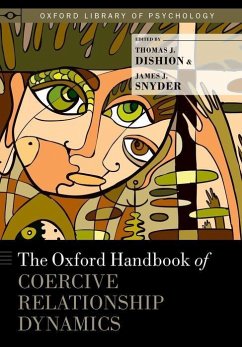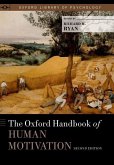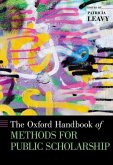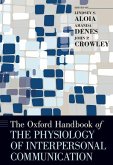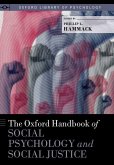The Oxford Handbook of Coercive Relationship Dynamics
Herausgeber: Dishion, Thomas J; Snyder, James J
The Oxford Handbook of Coercive Relationship Dynamics
Herausgeber: Dishion, Thomas J; Snyder, James J
- Gebundenes Buch
- Merkliste
- Auf die Merkliste
- Bewerten Bewerten
- Teilen
- Produkt teilen
- Produkterinnerung
- Produkterinnerung
The Oxford Handbook of Coercive Relationship Dynamics features the most recent, innovative applications of coercion theory to understanding psychopathology, developmental theory, and intervention science.
Andere Kunden interessierten sich auch für
![The Oxford Handbook of Human Motivation The Oxford Handbook of Human Motivation]() The Oxford Handbook of Human Motivation194,99 €
The Oxford Handbook of Human Motivation194,99 €![The Oxford Handbook of Methods for Public Scholarship The Oxford Handbook of Methods for Public Scholarship]() The Oxford Handbook of Methods for Public Scholarship264,99 €
The Oxford Handbook of Methods for Public Scholarship264,99 €![The Oxford Handbook of the Physiology of Interpersonal Communication The Oxford Handbook of the Physiology of Interpersonal Communication]() The Oxford Handbook of the Physiology of Interpersonal Communication229,99 €
The Oxford Handbook of the Physiology of Interpersonal Communication229,99 €![The Oxford Handbook of Social Psychology and Social Justice The Oxford Handbook of Social Psychology and Social Justice]() Phillip L HammackThe Oxford Handbook of Social Psychology and Social Justice206,99 €
Phillip L HammackThe Oxford Handbook of Social Psychology and Social Justice206,99 €![The Oxford Handbook of Evolutionary Psychology and Romantic Relationships The Oxford Handbook of Evolutionary Psychology and Romantic Relationships]() Justin K MogilskiThe Oxford Handbook of Evolutionary Psychology and Romantic Relationships226,99 €
Justin K MogilskiThe Oxford Handbook of Evolutionary Psychology and Romantic Relationships226,99 €![The Oxford Handbook of the Positive Humanities The Oxford Handbook of the Positive Humanities]() The Oxford Handbook of the Positive Humanities194,99 €
The Oxford Handbook of the Positive Humanities194,99 €![The Oxford Handbook of Evolutionary Psychology and Religion The Oxford Handbook of Evolutionary Psychology and Religion]() James R LiddleThe Oxford Handbook of Evolutionary Psychology and Religion228,99 €
James R LiddleThe Oxford Handbook of Evolutionary Psychology and Religion228,99 €-
-
-
The Oxford Handbook of Coercive Relationship Dynamics features the most recent, innovative applications of coercion theory to understanding psychopathology, developmental theory, and intervention science.
Hinweis: Dieser Artikel kann nur an eine deutsche Lieferadresse ausgeliefert werden.
Hinweis: Dieser Artikel kann nur an eine deutsche Lieferadresse ausgeliefert werden.
Produktdetails
- Produktdetails
- Verlag: Hurst & Co.
- Seitenzahl: 446
- Erscheinungstermin: 9. März 2016
- Englisch
- Abmessung: 257mm x 183mm x 41mm
- Gewicht: 921g
- ISBN-13: 9780199324552
- ISBN-10: 0199324557
- Artikelnr.: 47869301
- Herstellerkennzeichnung
- Libri GmbH
- Europaallee 1
- 36244 Bad Hersfeld
- gpsr@libri.de
- Verlag: Hurst & Co.
- Seitenzahl: 446
- Erscheinungstermin: 9. März 2016
- Englisch
- Abmessung: 257mm x 183mm x 41mm
- Gewicht: 921g
- ISBN-13: 9780199324552
- ISBN-10: 0199324557
- Artikelnr.: 47869301
- Herstellerkennzeichnung
- Libri GmbH
- Europaallee 1
- 36244 Bad Hersfeld
- gpsr@libri.de
Thomas J. Dishion, PhD, is Professor of Psychology at Arizona State University. He has conducted translational research on child and adolescent mental health for over 25 years. He has worked on theoretical models of child and adolescent socialization, family and peer interaction methodology, child and adolescent substance use and problem behavior, adolescent depression, family-based intervention, behavior-change theory, prevention science, dynamic systems, and most recently social neuroscience. James J. Snyder, PhD, is Professor of Psychology at Wichita State University. He is both a clinical and developmental research focusing on the social interaction patterns in the development of aggression and antisocial behavior. He has contributed to methodological advances in direct observation methods as well as the analysis of social interaction patterns. His research focuses on the development of psychopathology during childhood and adolescence from the perspective of socialization in family, sibling, peer, and school environments.
* 1. Introduction: Coercive Social Processes
* James Snyder, Thomas J. Dishion
* 2. Coercion Theory: The Study of Change
* Gerald R. Patterson
* 3. Gene-Environment Interplay in Coercion
* Kirby Deater-Deckard, Nan Chen, Shereen El-Mallah
* 4. Physiological and Developmental Mechanisms of Emotional Lability
in Coercive Relationships
* Theodore P. Beauchaine, Maureen Zalewski
* 5. An Evolutionary Framework for Understanding Coercion and
Aggression
* Thomas J. Dishion
* 6. Parental Depression and the Development of Coercion in Early
Childhood
* Julia D. Reuben, Daniel S. Shaw
* 7. A Relational Frame Theory (RFT) Analysis of Coercive Family
Process
* Lisa W. Coyne, Darin Cairns
* 8. Coercive Family Processes and the Development of Child Social
Behavior and Self-Regulation
* James Snyder
* 9. Fathers and Coercion Dynamics in Families: Developmental Impact,
Implications, and Intervention
* David S. DeGarmo, Kristin B. Nordahl, Gregory A. Fabiano
* 10. Coercion and Contagion in Child and Adolescent Peer Relationships
* Timothy F. Piehler
* 11. Peer Coercion and Electronic Messaging
* Samuel E. Ehrenreich, Marion K. Underwood
* 12. The Paradox of Love in Adolescent Romantic Relationships:
Upregulation and Coercive Dynamics as Predictors of Depressive
Symptoms
* Thao Ha, Hanjoe Kim
* 13. Aggression and Coercive Behaviors in Early Adult Relationships:
Findings From the Oregon Youth Study-Couples Study
* Hyuong K. Kim, Joann Wu Shortt, Stacey S. Tiberio, Deborah M. Capaldi
* 14. Coercion, Invalidation, and Risk for Self-Injury and Borderline
Personality Traits
* Sheila E. Crowell, Mona Yaptangco, Sara L. Turner
* 15. Interrupting Coercion: The Iterative Loops Among Theory, Science,
and Practice
* Marion S. Forgatch, Melanie M. Domenech Rodriguez
* 16. Violent Coercion in Intimate Relationships: Emerging
Interventions
* Amie Langer Zarling, Rosaura Orengo-Aguayo, Erika Lawrence
* 17. The Role of Anxiety in Coercive Family Processes With Aggressive
Children
* Isabela Granic, Jessica P. Lougheed
* 18.Coercion Dynamics and Problematic Anxiety in Children
* Michael J. Crowley, Wendy K. Silverman
* 19. Coercive Process and Intimate Partner Violence in Committed
Relationships
* Amy M. Slep, Richard E. Heyman, Michael F. Lorber
* 20. Child-Focused Cognitive-Behavioral Interventions Designed to
Reduce Aggression
* John E. Lochman, Caroline Boxmeyer, Nicole Powell, Thomas J. Dishion
* 21. Short- and Long-term Impacts of a Coercion Theory-Based
Intervention on Aggression on the School Playground
* J. Mark Eddy, Betsy J. Feldman. Charles R. Martinez Jr.
* 22. From School Bullying to Dating Violence: Coercive Developmental
Processes and Implications for Intervention
* Ariel A. Williamson, Nancy G. Guerra, Noel L. Shadowen
* 23. Changing Parental Perspectives of Coercion Dynamics: Essential
Therapist Skills in Using Videotaped Feedback Interventions
* Justin D. Smith
* 24. Reducing Coercion in Schools: The Impact of School-wide Positive
Behavioral Interventions and Supports
* Robert H. Horner, Kent McIntosh
* 25. Transforming Coercive Into Constructive Processes With Families
of Children With Developmental Disabilities and Severe Problem
Behavior
* Joseph Lucyshyn, Brenda Fossett, Christy Cheremshynski, Lynn Miller,
Sharon Lohrmann, Lauren Binnendyk, Sophia Khan, Stephen Chinn,
Samantha Kwon, Larry Irvin
* 26. Coercion and Public Health
* Anthony Biglan
* 27. An Introduction to Using Multivariate Multilevel Survival
Analysis to Study Coercive Family Process
* Michael Stoolmiller
* 28. Coercion, Power, and Control in Interdependent Relationships: A
Dynamic Systems Perspective
* George W. Howe, Laura Mlynarski
* 29. Coercion Dynamics: Past, Present, and Future
* Thomas J. Dishion, James Snyder
* Index
* James Snyder, Thomas J. Dishion
* 2. Coercion Theory: The Study of Change
* Gerald R. Patterson
* 3. Gene-Environment Interplay in Coercion
* Kirby Deater-Deckard, Nan Chen, Shereen El-Mallah
* 4. Physiological and Developmental Mechanisms of Emotional Lability
in Coercive Relationships
* Theodore P. Beauchaine, Maureen Zalewski
* 5. An Evolutionary Framework for Understanding Coercion and
Aggression
* Thomas J. Dishion
* 6. Parental Depression and the Development of Coercion in Early
Childhood
* Julia D. Reuben, Daniel S. Shaw
* 7. A Relational Frame Theory (RFT) Analysis of Coercive Family
Process
* Lisa W. Coyne, Darin Cairns
* 8. Coercive Family Processes and the Development of Child Social
Behavior and Self-Regulation
* James Snyder
* 9. Fathers and Coercion Dynamics in Families: Developmental Impact,
Implications, and Intervention
* David S. DeGarmo, Kristin B. Nordahl, Gregory A. Fabiano
* 10. Coercion and Contagion in Child and Adolescent Peer Relationships
* Timothy F. Piehler
* 11. Peer Coercion and Electronic Messaging
* Samuel E. Ehrenreich, Marion K. Underwood
* 12. The Paradox of Love in Adolescent Romantic Relationships:
Upregulation and Coercive Dynamics as Predictors of Depressive
Symptoms
* Thao Ha, Hanjoe Kim
* 13. Aggression and Coercive Behaviors in Early Adult Relationships:
Findings From the Oregon Youth Study-Couples Study
* Hyuong K. Kim, Joann Wu Shortt, Stacey S. Tiberio, Deborah M. Capaldi
* 14. Coercion, Invalidation, and Risk for Self-Injury and Borderline
Personality Traits
* Sheila E. Crowell, Mona Yaptangco, Sara L. Turner
* 15. Interrupting Coercion: The Iterative Loops Among Theory, Science,
and Practice
* Marion S. Forgatch, Melanie M. Domenech Rodriguez
* 16. Violent Coercion in Intimate Relationships: Emerging
Interventions
* Amie Langer Zarling, Rosaura Orengo-Aguayo, Erika Lawrence
* 17. The Role of Anxiety in Coercive Family Processes With Aggressive
Children
* Isabela Granic, Jessica P. Lougheed
* 18.Coercion Dynamics and Problematic Anxiety in Children
* Michael J. Crowley, Wendy K. Silverman
* 19. Coercive Process and Intimate Partner Violence in Committed
Relationships
* Amy M. Slep, Richard E. Heyman, Michael F. Lorber
* 20. Child-Focused Cognitive-Behavioral Interventions Designed to
Reduce Aggression
* John E. Lochman, Caroline Boxmeyer, Nicole Powell, Thomas J. Dishion
* 21. Short- and Long-term Impacts of a Coercion Theory-Based
Intervention on Aggression on the School Playground
* J. Mark Eddy, Betsy J. Feldman. Charles R. Martinez Jr.
* 22. From School Bullying to Dating Violence: Coercive Developmental
Processes and Implications for Intervention
* Ariel A. Williamson, Nancy G. Guerra, Noel L. Shadowen
* 23. Changing Parental Perspectives of Coercion Dynamics: Essential
Therapist Skills in Using Videotaped Feedback Interventions
* Justin D. Smith
* 24. Reducing Coercion in Schools: The Impact of School-wide Positive
Behavioral Interventions and Supports
* Robert H. Horner, Kent McIntosh
* 25. Transforming Coercive Into Constructive Processes With Families
of Children With Developmental Disabilities and Severe Problem
Behavior
* Joseph Lucyshyn, Brenda Fossett, Christy Cheremshynski, Lynn Miller,
Sharon Lohrmann, Lauren Binnendyk, Sophia Khan, Stephen Chinn,
Samantha Kwon, Larry Irvin
* 26. Coercion and Public Health
* Anthony Biglan
* 27. An Introduction to Using Multivariate Multilevel Survival
Analysis to Study Coercive Family Process
* Michael Stoolmiller
* 28. Coercion, Power, and Control in Interdependent Relationships: A
Dynamic Systems Perspective
* George W. Howe, Laura Mlynarski
* 29. Coercion Dynamics: Past, Present, and Future
* Thomas J. Dishion, James Snyder
* Index
* 1. Introduction: Coercive Social Processes
* James Snyder, Thomas J. Dishion
* 2. Coercion Theory: The Study of Change
* Gerald R. Patterson
* 3. Gene-Environment Interplay in Coercion
* Kirby Deater-Deckard, Nan Chen, Shereen El-Mallah
* 4. Physiological and Developmental Mechanisms of Emotional Lability
in Coercive Relationships
* Theodore P. Beauchaine, Maureen Zalewski
* 5. An Evolutionary Framework for Understanding Coercion and
Aggression
* Thomas J. Dishion
* 6. Parental Depression and the Development of Coercion in Early
Childhood
* Julia D. Reuben, Daniel S. Shaw
* 7. A Relational Frame Theory (RFT) Analysis of Coercive Family
Process
* Lisa W. Coyne, Darin Cairns
* 8. Coercive Family Processes and the Development of Child Social
Behavior and Self-Regulation
* James Snyder
* 9. Fathers and Coercion Dynamics in Families: Developmental Impact,
Implications, and Intervention
* David S. DeGarmo, Kristin B. Nordahl, Gregory A. Fabiano
* 10. Coercion and Contagion in Child and Adolescent Peer Relationships
* Timothy F. Piehler
* 11. Peer Coercion and Electronic Messaging
* Samuel E. Ehrenreich, Marion K. Underwood
* 12. The Paradox of Love in Adolescent Romantic Relationships:
Upregulation and Coercive Dynamics as Predictors of Depressive
Symptoms
* Thao Ha, Hanjoe Kim
* 13. Aggression and Coercive Behaviors in Early Adult Relationships:
Findings From the Oregon Youth Study-Couples Study
* Hyuong K. Kim, Joann Wu Shortt, Stacey S. Tiberio, Deborah M. Capaldi
* 14. Coercion, Invalidation, and Risk for Self-Injury and Borderline
Personality Traits
* Sheila E. Crowell, Mona Yaptangco, Sara L. Turner
* 15. Interrupting Coercion: The Iterative Loops Among Theory, Science,
and Practice
* Marion S. Forgatch, Melanie M. Domenech Rodriguez
* 16. Violent Coercion in Intimate Relationships: Emerging
Interventions
* Amie Langer Zarling, Rosaura Orengo-Aguayo, Erika Lawrence
* 17. The Role of Anxiety in Coercive Family Processes With Aggressive
Children
* Isabela Granic, Jessica P. Lougheed
* 18.Coercion Dynamics and Problematic Anxiety in Children
* Michael J. Crowley, Wendy K. Silverman
* 19. Coercive Process and Intimate Partner Violence in Committed
Relationships
* Amy M. Slep, Richard E. Heyman, Michael F. Lorber
* 20. Child-Focused Cognitive-Behavioral Interventions Designed to
Reduce Aggression
* John E. Lochman, Caroline Boxmeyer, Nicole Powell, Thomas J. Dishion
* 21. Short- and Long-term Impacts of a Coercion Theory-Based
Intervention on Aggression on the School Playground
* J. Mark Eddy, Betsy J. Feldman. Charles R. Martinez Jr.
* 22. From School Bullying to Dating Violence: Coercive Developmental
Processes and Implications for Intervention
* Ariel A. Williamson, Nancy G. Guerra, Noel L. Shadowen
* 23. Changing Parental Perspectives of Coercion Dynamics: Essential
Therapist Skills in Using Videotaped Feedback Interventions
* Justin D. Smith
* 24. Reducing Coercion in Schools: The Impact of School-wide Positive
Behavioral Interventions and Supports
* Robert H. Horner, Kent McIntosh
* 25. Transforming Coercive Into Constructive Processes With Families
of Children With Developmental Disabilities and Severe Problem
Behavior
* Joseph Lucyshyn, Brenda Fossett, Christy Cheremshynski, Lynn Miller,
Sharon Lohrmann, Lauren Binnendyk, Sophia Khan, Stephen Chinn,
Samantha Kwon, Larry Irvin
* 26. Coercion and Public Health
* Anthony Biglan
* 27. An Introduction to Using Multivariate Multilevel Survival
Analysis to Study Coercive Family Process
* Michael Stoolmiller
* 28. Coercion, Power, and Control in Interdependent Relationships: A
Dynamic Systems Perspective
* George W. Howe, Laura Mlynarski
* 29. Coercion Dynamics: Past, Present, and Future
* Thomas J. Dishion, James Snyder
* Index
* James Snyder, Thomas J. Dishion
* 2. Coercion Theory: The Study of Change
* Gerald R. Patterson
* 3. Gene-Environment Interplay in Coercion
* Kirby Deater-Deckard, Nan Chen, Shereen El-Mallah
* 4. Physiological and Developmental Mechanisms of Emotional Lability
in Coercive Relationships
* Theodore P. Beauchaine, Maureen Zalewski
* 5. An Evolutionary Framework for Understanding Coercion and
Aggression
* Thomas J. Dishion
* 6. Parental Depression and the Development of Coercion in Early
Childhood
* Julia D. Reuben, Daniel S. Shaw
* 7. A Relational Frame Theory (RFT) Analysis of Coercive Family
Process
* Lisa W. Coyne, Darin Cairns
* 8. Coercive Family Processes and the Development of Child Social
Behavior and Self-Regulation
* James Snyder
* 9. Fathers and Coercion Dynamics in Families: Developmental Impact,
Implications, and Intervention
* David S. DeGarmo, Kristin B. Nordahl, Gregory A. Fabiano
* 10. Coercion and Contagion in Child and Adolescent Peer Relationships
* Timothy F. Piehler
* 11. Peer Coercion and Electronic Messaging
* Samuel E. Ehrenreich, Marion K. Underwood
* 12. The Paradox of Love in Adolescent Romantic Relationships:
Upregulation and Coercive Dynamics as Predictors of Depressive
Symptoms
* Thao Ha, Hanjoe Kim
* 13. Aggression and Coercive Behaviors in Early Adult Relationships:
Findings From the Oregon Youth Study-Couples Study
* Hyuong K. Kim, Joann Wu Shortt, Stacey S. Tiberio, Deborah M. Capaldi
* 14. Coercion, Invalidation, and Risk for Self-Injury and Borderline
Personality Traits
* Sheila E. Crowell, Mona Yaptangco, Sara L. Turner
* 15. Interrupting Coercion: The Iterative Loops Among Theory, Science,
and Practice
* Marion S. Forgatch, Melanie M. Domenech Rodriguez
* 16. Violent Coercion in Intimate Relationships: Emerging
Interventions
* Amie Langer Zarling, Rosaura Orengo-Aguayo, Erika Lawrence
* 17. The Role of Anxiety in Coercive Family Processes With Aggressive
Children
* Isabela Granic, Jessica P. Lougheed
* 18.Coercion Dynamics and Problematic Anxiety in Children
* Michael J. Crowley, Wendy K. Silverman
* 19. Coercive Process and Intimate Partner Violence in Committed
Relationships
* Amy M. Slep, Richard E. Heyman, Michael F. Lorber
* 20. Child-Focused Cognitive-Behavioral Interventions Designed to
Reduce Aggression
* John E. Lochman, Caroline Boxmeyer, Nicole Powell, Thomas J. Dishion
* 21. Short- and Long-term Impacts of a Coercion Theory-Based
Intervention on Aggression on the School Playground
* J. Mark Eddy, Betsy J. Feldman. Charles R. Martinez Jr.
* 22. From School Bullying to Dating Violence: Coercive Developmental
Processes and Implications for Intervention
* Ariel A. Williamson, Nancy G. Guerra, Noel L. Shadowen
* 23. Changing Parental Perspectives of Coercion Dynamics: Essential
Therapist Skills in Using Videotaped Feedback Interventions
* Justin D. Smith
* 24. Reducing Coercion in Schools: The Impact of School-wide Positive
Behavioral Interventions and Supports
* Robert H. Horner, Kent McIntosh
* 25. Transforming Coercive Into Constructive Processes With Families
of Children With Developmental Disabilities and Severe Problem
Behavior
* Joseph Lucyshyn, Brenda Fossett, Christy Cheremshynski, Lynn Miller,
Sharon Lohrmann, Lauren Binnendyk, Sophia Khan, Stephen Chinn,
Samantha Kwon, Larry Irvin
* 26. Coercion and Public Health
* Anthony Biglan
* 27. An Introduction to Using Multivariate Multilevel Survival
Analysis to Study Coercive Family Process
* Michael Stoolmiller
* 28. Coercion, Power, and Control in Interdependent Relationships: A
Dynamic Systems Perspective
* George W. Howe, Laura Mlynarski
* 29. Coercion Dynamics: Past, Present, and Future
* Thomas J. Dishion, James Snyder
* Index

